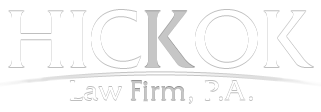Wills, Trusts & Estates
The firm helps clients plan for death and incapacity.
The firm handles virtually all matters related to wills, trusts, and estates. The two main categories in this area are (1) estate planning, which is the drafting of documents and the arranging of affairs for the event of death or incapacity and (2) estate (probate) and trust administration after death.
A typical estate planning engagement proceeds as follows: The client (or clients) meets with the attorney for an information-gathering session. It is very important for the client to tell the attorney about all of the assets the client owns and, especially, how each asset is titled. For example, a bank account might be owned in the client’s sole name, it might be owned jointly with another person, it might have a beneficiary designation associated with it, etc. Depending on how an asset is titled, the asset may pass at the client’s death pursuant to the client’s last will and testament, or it may pass via some other document, such as a beneficiary form, a document of title, or a trust agreement. For example, a parcel of non-homestead real estate owned in a person’s sole name passes pursuant to the person’s last will and testament, but a homestead residence may not, and a jointly-titled parcel of real estate may not. For example, an IRA or a life insurance policy usually passes pursuant to a beneficiary form, not pursuant to a person’s last will and testament. It is very important that the attorney understand what document controls the disposition of each asset and thus it is very important that the attorney understand how each of the client’s assets is titled. A good portion of the initial meeting will be spent gaining that understanding.
The client should be prepared to tell the attorney at the initial meeting how the client desires all of his or her assets to pass on death. The attorney will then devise a plan to help carry out those wishes via some combination of a last will and testament, a trust or trusts, beneficiary form changes, changes to asset titles, etc.
The attorney and the client will also discuss at the initial meeting incapacity planning and end-of-life matters. They will discuss who, if anyone, the client will name to manage his or her affairs if the client becomes incapacitated. They will discuss whether the client desires any life prolonging procedures to be performed at the end of his or her life.
The client at the initial meeting should be prepared to give the attorney names and contact information of any person the client will be naming as a beneficiary or as a fiduciary in any of the client’s documents.
After the initial meeting, the attorney will prepare the agreed-upon documents. The typical documents are (1) last will and testament, (2) durable power of attorney, (3) designation of health care surrogate, and (4) living will. In many cases, the attorney prepares a trust. In some cases, the attorney assists with filling out beneficiary forms, usually associated with IRAs and life insurance. During this process, the attorney may call the client one or more times to ask questions that arise while the attorney is drafting. Once the documents are finished, the attorney and the client will meet again to review and sign the documents.
Regarding estate and trust administration: The firm represents personal representatives and trustees in the administration of estates and trusts. For example, if a person names a son as his or her personal representative to manage and wrap up the person’s affairs, the son might hire this firm to represent him in that endeavor. The deceased person may or may not have been an estate planning client of this firm. The firm also represents non-fiduciary beneficiaries of estates and trusts to help them understand what is happening and/ or to keep a close eye on the fiduciaries. For example, if a person is the beneficiary of a trust and that person has any concerns about how the trustee is managing things, the person might hire this firm to represent him or her.
Estate administration involves probate court. The firm normally handles probate in Palm Beach County. However, because most court work is done electronically these days, the firm can handle probate administration in any Florida county, even in the Panhandle. The firm has handled probate cases as far away as Madison County with no difficulty.
Because of the firm’s accounting practice, there is generally no need to engage a separate accounting firm to prepare the tax returns related to estates and trusts. This tends to reduce costs because there is no need for a separate accounting firm to spend time getting up to speed about the case. Furthermore, certain aspects of estate and trust accounting, a very unique type of accounting, are better handled by professionals who are both CPAs and attorneys.
Engagements regarding estate and trust administration can last for months or years depending on many factors, including (1) how good the decedent’s estate planning was, (2) what sorts of assets the decedent owned (some assets are much more difficult to deal with than others), (3) whether the decedent was involved in ongoing litigation at the time of death, (4) whether any creditors have filed claims and especially whether any of those claims are disputed, (5) whether the decedent owes money to the IRS or another taxing authority, and (6) whether there is any arguing among the beneficiaries and/ or the fiduciaries.
Why Hickok Law?
Robert Hickok
Robert is the Founder and President of Hickok Law Firm, P.A. From the University of Florida he holds a B.S. and an M.S. in Accounting, a J.D., and an LL.M. in Taxation. He is a lawyer and a CPA. Robert sits on the advisory board of the Greater Delray Beach Chamber of Commerce; before terming out he sat on the main board as the Finance Chair. Robert has been practicing law and accounting since 2004.
Lauren Hickok
Lauren is the Office Manager at Hickok Law Firm, P.A. From Palm Beach Atlantic University, she holds a B.S in Business Marketing and an M.S in Counseling Psychology.
